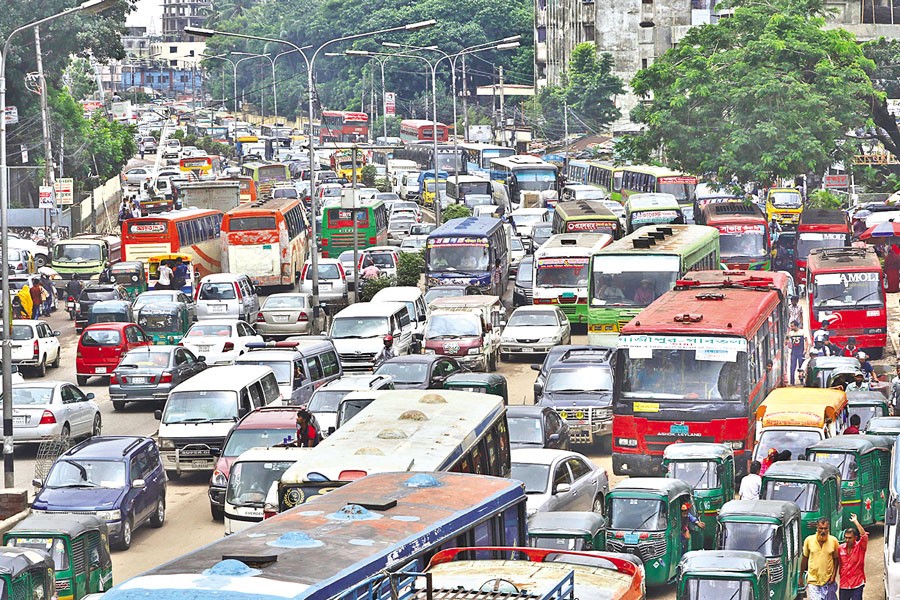
Published :
Updated :

Dhaka’s residents find themselves ensnared in traffic snarl-up for 46 minutes every two hours, according to a study.
The study also showed that on average 23 minutes are lost per hour due to traffic jams in Dhaka, resulting in not only wasted time but also increased fuel consumption and a negative impact on overall productivity.
The study titled 'Reducing Air and Plastic Pollution: Towards Green Cities in Bangladesh' was released by local think-tank Centre for Policy Dialogue (CPD). It has identified traffic congestion as a primary concern in Dhaka.
While sharing the findings at a programme in Dhaka on Wednesday, CPD drew attention to toxic air and plastics as major contributors to environmental pollution.
The study also revealed that individuals in Dhaka spend an average of Tk 4000 per year on diagnosing and treating symptoms related to air pollution.
In response to these concerning findings, CPD has recommended implementing a range of taxes, including a carbon tax, as a means to mitigate pollution levels and promote a more environmentally sustainable urban landscape.
"Bangladesh can implement a carbon tax equivalent to 3 per cent of the price of fossil fuels starting from the next fiscal year, in order to gradually meet the government's target, set out in the Eighth Five Year Plan," said Syed Yusuf Saadat, research fellow of CPD, while unveiling the study at the Brac Center in the city.
The Eighth Five-Year Plan aims to implement a 5 per cent carbon tax on the price of fossil fuels by 2025 and a 15 per cent carbon tax on the price of fossil fuels by 2041.
According to CPD recommendations, the government should reform the advance income tax (AIT) structure on private motor vehicles to reduce air pollution originating from the transport sector.
This would mean that the AIT on fossil fuel-driven motor vehicles is 5 per cent to 50 per cent higher than the AIT on hybrid, fully electric vehicles, and hydrogen vehicles, depending on the size of the engine and electric motor of the vehicle, the study recommended.
Apart from the AIT on private vehicles, it also suggested the government should consider imposing a small AIT on motorcycles.
The CPD recommends the government consider bringing plastic products made with less than 30 per cent recycled plastic under taxation to encourage plastic recycling and reduce the use of virgin plastic.
It also urges the government to immediately reinstate the 5 per cent supplementary duty on plastic bags, which was withdrawn in fiscal year 2023.
The CPD further recommended that the relatively low customs duty on plastic waste needs to be raised to increase the cost of importing plastic waste. This would cause plastic makers to find their raw materials domestically, thereby boosting domestic plastic recycling.
The government should pass a regulation that requires the phasing out of all fixed chimney brick kilns in Bangladesh by 2028, and completely shifting all brick manufacturing to less polluting forms of brick kilns, such as improved zigzag kilns, hybrid Hoffman kilns and vertical shaft brick kilns, said the study.
It noted that the government should immediately stop approving any new coal-based power plants, and gradually decommission and phase out all existing coal-based power plants, including the Rampal power plant near Sundarbans, which is apprehended to destroy the ecosystem.
The Finance Act of 2014 set a 1 per cent surcharge on goods produced by industries polluting the environment. "This environment protection surcharge should be fully implemented," it said.
Speaking as the chief guest, Deputy Minister for Environment, Forest and Climate Change Habibun Nahar said, "A lot of trees have been cut in the name of making roads by deceiving the prime minister, but that has stopped now. The prime minister has realised this [issue] and now approves road construction projects only after proper verification."
Saying that roads are constructed abroad while keeping forests intact, she said project authorities in the country indiscriminately cut trees despite being well aware of its adverse effects on the environment.
Acting British High Commissioner Matt Cannell said democratic institutions are important to transform policy into implementation to ensure environmentally compliant developments, which are part of sustainable development goals (SDGs) as well. He said Bangladesh alone cannot deal with the environmental issue as there is a regional aspect to it.
CPD Executive Director Fahmida Khatun moderated the dialogue.
bdsmile@gmail.com


 For all latest news, follow The Financial Express Google News channel.
For all latest news, follow The Financial Express Google News channel.